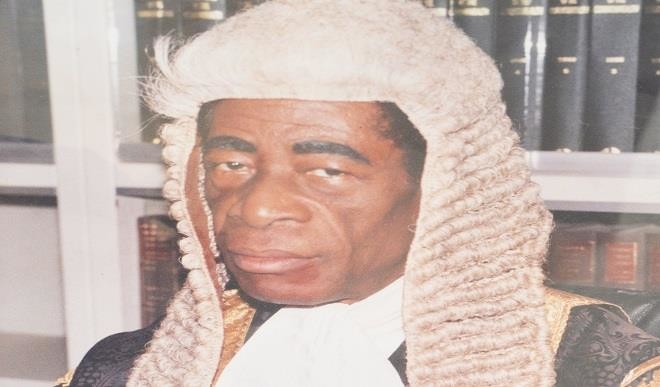John Afolabi Fabiyi: Legal colossus
Last Wednesday, Justice John Afolabi Fabiyi, a distinguished jurist and illustrious son of Nigeria, bowed out of the Supreme Court of Nigeria (SCN), on the attainment of the mandatory 70 years statutory age of retirement from the SCN. Fabiyi can best be described as a jurist per excellence who has contributed immensely to the development […]


Last Wednesday, Justice John Afolabi Fabiyi, a distinguished jurist and illustrious son of Nigeria, bowed out of the Supreme Court of Nigeria (SCN), on the attainment of the mandatory 70 years statutory age of retirement from the SCN.
Fabiyi can best be described as a jurist per excellence who has contributed immensely to the development of the legal profession through a plethora of landmark judgments and judicial pronouncements on topical issues brought before him.
In his lead judgment in the case between Dr. Taiwo Oloruntoba and 48 others Vs. University of Ilorin and another, he firmly established the capacity of the Supreme Court to truly serve as the last hope of the common man.
That decision, according to the Attorney-General of the Federation (AGF) and Minister for Justice Abubakar Malami (SAN) became a reference point in the capacity of the Supreme Court to do substantial justice in matters brought before it and reaffirmed the confidence of the Nigerian people in the judiciary as the last bastion of hope and justice.
Malami said: “In reinstating the sacked 49 lecturers of the University of Ilorin, Justice Afolabi led the court in further demonstrating its capacity for fairness and justice through the inclusion of the three lecturers who passed away in the course of the protracted legal dispute, as they were deemed to have died in active service.”
It is no wonder therefore that Oloruntoba & others Vs. University of Ilorin and another has today become one of the high points of the history of SCN.
Regardless of the nature of the case his lordship is deciding upon, he is thorough in his judgments, with his clarity of thought and his primary consideration is for doing justice in all cases.
In the case of AG Lagos vs. AGF and 35 others (2014), he stressed the need for jurisdiction to be a primary consideration for the SCN in determining any dispute between the state government and an agency of the FG.
In that case, Justice Fabiyi held: “If a court has no jurisdiction to hear and determine a case, the proceedings remain a nullity ab initio, no matter how well conducted and decided. It is now beyond dispute that the Federation of Nigeria is distinct and separate from the Federal Government of Nigeria (FGN) which often, is a product of election. On the other hand, the federation of Nigeria remains intact for all times; all things being equal. The two are not synonymous at all. To invoke the jurisction of this court under (the above stated) section 232(1) of the Constitution, there must be a dispute between the Federation and/ or more States as component parts of the Federation or between States inter se. since the FGN is not expressly mentioned in the said section, it is excluded by implication.”
He will equally be remembered for his role on the panels which elucidated the proper channels in resolving disciplinary matters, involving legal practitioners, through the judgments in the matters of Rotimi Williams Akintokun Vs. Legal Practitioners Disciplinary Committee in 2014 as well as Aladejobi Vs. NBA in 2013, which led to clarity on the point that an appellant could not directly appeal to the SCN from a decision of the LPDC, without first having recourse to the Appeals Committee of the Body of Benchers.
As a judge, his decisions, particularly on the Supreme Court bench, reflected peculiar clarity and preciseness of thought, as well as a propensity to emphasise the fine ingredients of justice over the hurdles posed by technicalities.
Former President of the Nigerian Bar Association (NBA), Joseph Daudu, in a tribute to Justice Fabiyi during the public presentation of the book: “John Afolabi Fabiyi, selected judgments,” published by Centre for Socio-legal studies (CSLS), described the retired jurist as a pragmatic judge not given to fanciful epithets in writing of his judgments.
According to Daudu, his judgments were crisp and clean, demonstrative of an astute legal mind, adding: “One aspect of his career is that he is a hard working judge with the ability to churn out numerous lead judgments within a short period of time. He is also known to state the law as he perceives it, without mincing words or minding whose ox is or will be gored.
In the celebrated cases of First Bank of Nigeria Plc Vs. Alhaji Maiwada (2013) 5 NWLR pt. 1348 page 444 at 488 where the issue before a full panel of the SCN was whether their earlier decision in Okafor Vs Nweke (wherein it was affirmed that only an identifiable legal practitioner as opposed to a law firm, can sign or execute legal processes) should be departed from. His lordship stick firmly to the notion of discipline within the legal profession and refused to set aside the court’s earlier decision in Okafor vs. Nweke.”
Apart from Bayo Ojo and JB Daudu, other Senior Advocates of Nigeria (SAN) that had their tributes published in the book are Chief Wole Olanipekun, Prince Lateef Fagbemi, Dr. Alex Izinyon, Malam Yusuf Ali, Yakubu Maikyau and Dr. Akin Onigbinde.
Justice Fabiyi was born on November 25, 1945, in Kogi State. Following his primary and secondary education, he obtained his bachelor’s degree in law from the Ahmadu Bello University, Zaria, in 1969.he attended the Nigerian Law School and was called to the Bar in 1970. He was elevated to the Supreme Court bench in 2009 as one of its justices.
